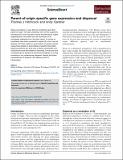Parent-of-origin specific gene expression and dispersal
Abstract
Genes can behave in ways that are conditional upon their parent-of-origin. The best understood form of this is genomic imprinting, which typically involves the silencing of a gene originating from one parent and the expression of its homologue originating from the other parent. A number of hypotheses have been proposed to explain genomic imprinting, which may be grouped into those based on asymmetries of genetic interest versus those based on asymmetries of genetic information. Dispersal patterns can drive both of these asymmetries and modulate the costs and benefits of imprinting. Genomic imprinting may also have consequences for dispersal, by driving imprinting of loci underpinning dispersal, altering the fitness consequences of dispersal, and affecting rates of introgression.
Citation
Hitchcock , T & Gardner , A 2019 , ' Parent-of-origin specific gene expression and dispersal ' , Current Opinion in Behavioral Sciences , vol. 25 , pp. 36-43 . https://doi.org/10.1016/j.cobeha.2018.06.007
Publication
Current Opinion in Behavioral Sciences
Status
Peer reviewed
ISSN
2352-1546Type
Journal item
Description
TJH is supported by a PhD studentship awarded by the School of Biology, University of St Andrews, and AG is supported by a NERC Independent Research Fellowship (NE/ K009524/1) and an ERC Consolidator Grant (771387).Collections
Items in the St Andrews Research Repository are protected by copyright, with all rights reserved, unless otherwise indicated.

